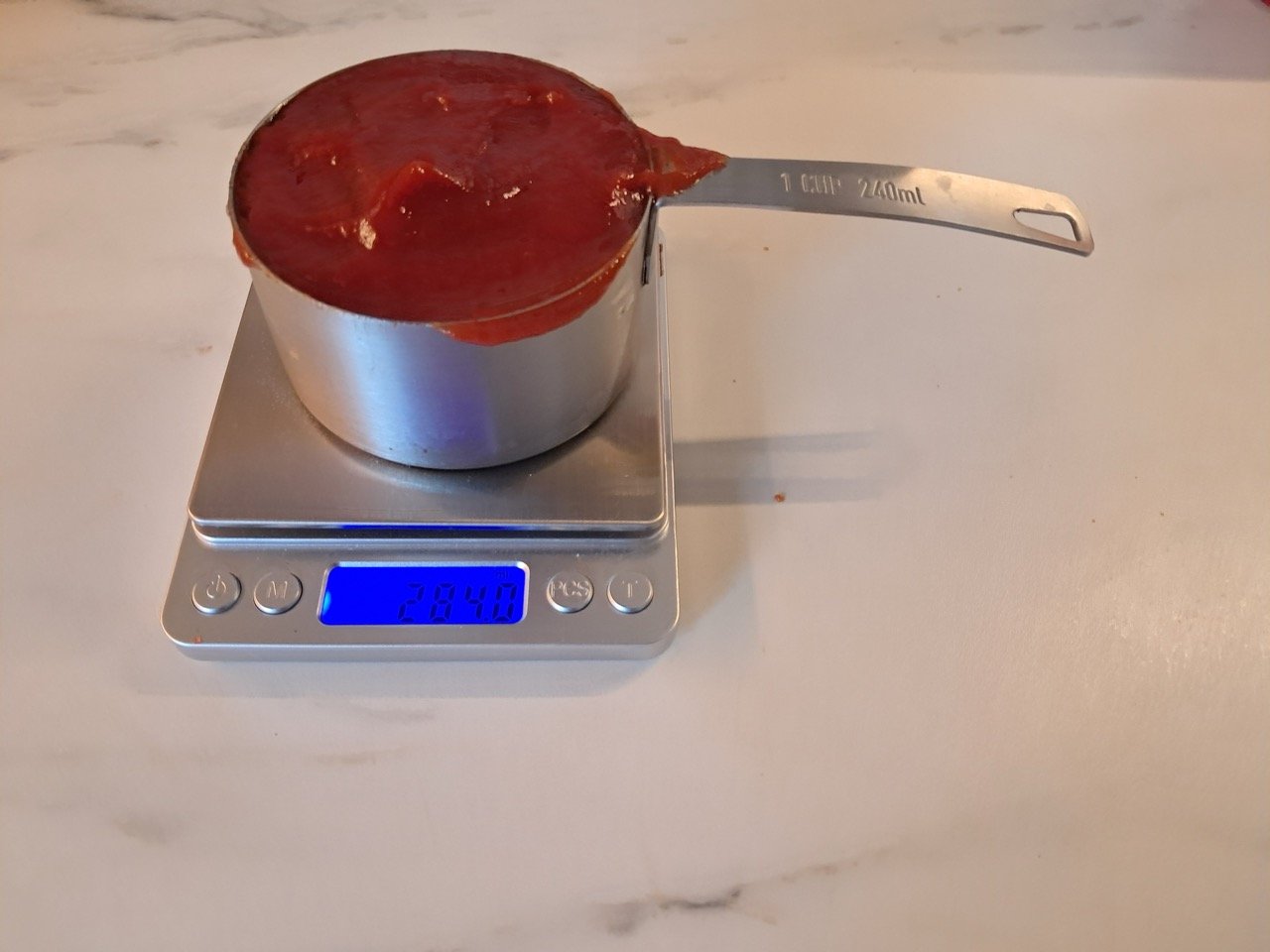Ketchup is one of the most beloved and widely used condiments across the globe. From classic American burgers and fries to dishes with international flair, ketchup has become a staple in kitchens everywhere. Known for its sweet, tangy flavor and vibrant red hue, ketchup not only enhances the taste of various foods but also serves as a versatile ingredient in many recipes, from marinades to dressings and beyond.
However, despite its ubiquitous presence, using ketchup in cooking can sometimes be tricky, especially when it comes to measuring it accurately for recipes. The consistency of ketchup, being neither fully liquid nor solid, can make precise measurement challenging, which is essential to achieving the right balance of flavors and textures in your dishes.
This article aims to simplify the process of measuring and converting ketchup quantities in the kitchen. By understanding how to convert ketchup measurements from one unit to another and making the necessary adjustments in your recipes, you can ensure that your culinary creations turn out just right every time.
Understanding Ketchup
Ketchup has a long and storied history that dates back to ancient China, where it originated as a fermented fish sauce known as “ke-tsiap.” Over centuries, this condiment evolved as it spread through various cultures, eventually transforming into the tomato-based sauce we know today. The modern version of ketchup, with its unique blend of tomatoes, vinegar, sugar, and spices, became popular in the United States in the 19th century, thanks in large part to the mass production methods pioneered by companies like Heinz.
Today, ketchup is more than just a condiment; it’s a cultural icon. Its versatility in both cooking and as a topping has made it a household essential.
- Common Varieties: While classic tomato ketchup is the most popular, there are many variations, including spicy, organic, and sugar-free versions, catering to a range of taste preferences and dietary needs.
- Global Appeal: Ketchup’s popularity isn’t confined to the United States. It’s used in various global cuisines, often with unique regional twists, such as banana ketchup in the Philippines or curry ketchup in Germany.
Common Uses in Cooking
Ketchup’s versatility extends far beyond its role as a condiment. Here are some common ways ketchup is used in cooking:
- Condiment: The most familiar use of ketchup is as a topping for burgers, hot dogs, and fries.
- Marinades and Glazes: Ketchup is often used as a base for marinades and glazes, adding sweetness and acidity to meats like chicken and ribs.
- Sauces: Ketchup can be combined with other ingredients to create a variety of sauces, such as barbecue sauce or cocktail sauce.
- Dressings: It serves as a key ingredient in dressings for salads and slaws, adding a tangy flavor.
- Meatloaf: A classic American dish, meatloaf often incorporates ketchup both in the mix and as a glaze on top.
Nutritional Profile and Considerations
While ketchup is loved for its flavor, it’s important to be mindful of its nutritional content:
- Calories and Sugar: Ketchup is relatively low in calories, but it often contains added sugars. For those watching their sugar intake, there are low-sugar and sugar-free options available.
- Sodium Content: Ketchup can also be high in sodium, which is a consideration for those managing their salt intake.
- Vitamins: Despite its reputation as a processed food, ketchup does contain some vitamins, particularly vitamin A and C, thanks to the tomatoes.
Studies have suggested that ketchup, due to its tomato base, contains lycopene, an antioxidant linked to various health benefits, including reduced risk of heart disease. However, moderation is key, as the added sugars and sodium can offset these benefits if consumed in large quantities.
Ketchup Conversion Tables And Formulas
Ketchup is also called tomato ketchup. All names refer to the same ingredient, so conversion rates shown below are valid for each of these.
Most Common Conversions for Ketchup
- 1 teaspoon of ketchup: 6 grams.
- 1 tablespoon of ketchup: 17 grams.
- 1 US cup of ketchup: 279 grams.
- 1 UK cup of ketchup: 290 grams.
Ketchup US Cups to Grams and Ounces
| US Cups of ketchup (tomato ketchup) | Amount in grams (g) | Amount in ounces (oz) |
|---|---|---|
| 1/8 cup | 35 g | 1.23 oz |
| 1/4 cup | 70 g | 2.46 oz |
| 1/3 cup | 93 g | 3.28 oz |
| 3/8 cup | 105 g | 3.69 oz |
| 1/2 cup | 139 g | 4.92 oz |
| 5/8 cup | 174 g | 6.15 oz |
| 2/3 cup | 186 g | 6.56 oz |
| 3/4 cup | 209 g | 7.38 oz |
| 7/8 cup | 244 g | 8.61 oz |
| 1 cup | 279 g | 9.84 oz |
| 2 cups | 558 g | 19.67 oz |
| 3 cups | 836 g | 29.51 oz |
| 4 cups | 1115 g | 39.34 oz |
| 5 cups | 1394 g | 49.18 oz |
| 6 cups | 1673 g | 59.01 oz |
| 7 cups | 1952 g | 68.85 oz |
| 8 cups | 2231 g | 78.68 oz |
| 9 cups | 2509 g | 88.52 oz |
| 10 cups | 2788 g | 98.35 oz |
Ketchup UK Cups to Grams and Ounces
| UK Cups of ketchup (tomato ketchup) | Amount in grams (g) | Amount in ounces (oz) |
|---|---|---|
| 1/8 cup | 36 g | 1.28 oz |
| 1/4 cup | 73 g | 2.56 oz |
| 1/3 cup | 97 g | 3.41 oz |
| 3/8 cup | 109 g | 3.84 oz |
| 1/2 cup | 145 g | 5.12 oz |
| 5/8 cup | 182 g | 6.4 oz |
| 2/3 cup | 194 g | 6.83 oz |
| 3/4 cup | 218 g | 7.68 oz |
| 7/8 cup | 254 g | 8.96 oz |
| 1 cup | 290 g | 10.24 oz |
| 2 cups | 581 g | 20.49 oz |
| 3 cups | 871 g | 30.73 oz |
| 4 cups | 1162 g | 40.98 oz |
| 5 cups | 1452 g | 51.22 oz |
| 6 cups | 1743 g | 61.47 oz |
| 7 cups | 2033 g | 71.71 oz |
| 8 cups | 2324 g | 81.96 oz |
| 9 cups | 2614 g | 92.2 oz |
| 10 cups | 2904 g | 102.45 oz |
Ketchup Tablespoons to Grams and Ounces
| Tbsp of ketchup (tomato ketchup) | Amount in grams (g) | Amount in ounces (oz) |
|---|---|---|
| 1/4 tbsp | 4 g | 0.15 oz |
| 1/3 tbsp | 6 g | 0.2 oz |
| 1/2 tbsp | 9 g | 0.31 oz |
| 1 tbsp | 17 g | 0.61 oz |
| 2 tbsp | 35 g | 1.23 oz |
| 3 tbsp | 52 g | 1.84 oz |
| 4 tbsp | 70 g | 2.46 oz |
| 5 tbsp | 87 g | 3.07 oz |
| 6 tbsp | 105 g | 3.69 oz |
| 7 tbsp | 122 g | 4.3 oz |
| 8 tbsp | 139 g | 4.92 oz |
| 9 tbsp | 157 g | 5.53 oz |
| 10 tbsp | 174 g | 6.15 oz |
Ketchup Teaspoons to Grams and Ounces
| Tsp of ketchup (tomato ketchup) | Amount in grams (g) | Amount in ounces (oz) |
|---|---|---|
| 1 tsp | 6 g | 0.2 oz |
| 2 tsp | 12 g | 0.41 oz |
| 3 tsp | 17 g | 0.61 oz |
| 4 tsp | 23 g | 0.82 oz |
| 5 tsp | 29 g | 1.02 oz |
| 6 tsp | 35 g | 1.23 oz |
| 7 tsp | 41 g | 1.43 oz |
| 8 tsp | 46 g | 1.64 oz |
| 9 tsp | 52 g | 1.84 oz |
| 10 tsp | 58 g | 2.05 oz |
Metric vs. Imperial Conversions
When working with ketchup in the kitchen, it's essential to be adept at converting between the metric and imperial systems of measurement. This skill ensures accuracy in following recipes from different culinary traditions around the world.
The metric system, commonly used around the world, measures ketchup primarily in grams and kilograms. This system is favored for its simplicity and ease of scaling.
Predominantly used in the United States, the imperial system measures ketchup in tablespoons and teaspoons. While not as straightforward as scaling, it is deeply integrated into many traditional American recipes.
Common Measurement Units for Ketchup
Ketchup can be measured by either volume or weight. Viscous ingredients, such as ketchup, are very difficult to accurately measure by volume (e.g. cups). Cups measurement for ketchup are not precise, different measurements can differ by 10% or more. Use a kitchen scale instead for precise measurement.
Most typical volume measurements for ketchup are:
- Teaspoons (tsp)
- Tablespoons (tbsp)
- Cups
Most typical weight measurements for ketchup are:
- Ounces (oz)
- Grams (g)
- Kilograms (kg)
- Pounds (lbs)
How We Measure Ketchup?
To make sure that our conversion rates are correct, we don't just copy data from other websites. We actually take at least 5 different measurements of 1 cup of ketchup and use the average for calculations and conversion tables. Read more on our measurement methodology by clicking on this link.

